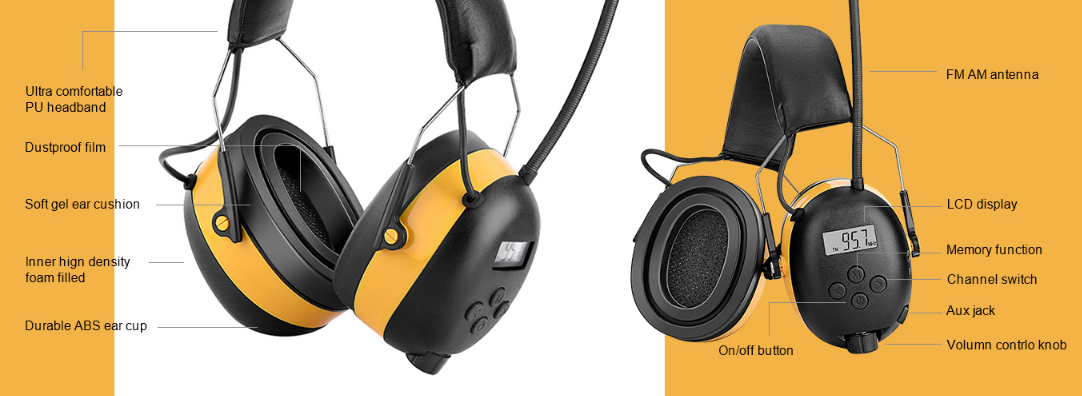The danger of noise-induced hearing loss is a significant concern in contemporary noisy settings. Listening to loud music with headphones increases the risk of hearing impairment. However, in persistently noisy environments, where raising the volume seems inevitable, what options does one have?
Noise-canceling headphones offer a solution to the ongoing struggle between your headphones and external sounds. By effectively eliminating background noise, these headphones enable you to maintain a lower volume for your music or podcast, contributing to the protection of your hearing.
Two distinct types of noise-canceling headphones offer hearing protection through contrasting methods.
Passive Noise-Canceling (PNC) headphones primarily rely on a robust design that creates soundproofing, effectively sealing your ears off from external noises. While PNC headphones typically fit snugly and may feel weighty, they excel at blocking out various sounds, especially sudden explosive noises like gunshots or firecrackers, as well as high-frequency sounds such as a baby crying or a dog howling.
On the other hand, Active Noise-Canceling (ANC) headphones utilize sound-matching technology to essentially "erase" external sounds. They identify the pitch of ambient sounds nearby, such as the whir of a jet engine or the collective hum of a crowded coffee shop, performing most effectively in environments where the overall sound and volume remain consistent.
ANC headphones require a brief "settling" time to analyze sound waves and subsequently generate canceling sound waves that are precisely 180 degrees out of phase.

Yes and no. While noise-canceling headphones offer some level of ear protection, they are not flawless.
Passive noise-canceling headphones provide hearing protection by sealing your ears off from loud external sounds, especially transient ones like gunshots or explosions.
Active noise-canceling headphones offer partial hearing protection since they reduce ambient outside noise, allowing you to listen to your music at lower volumes. However, it's essential to note that using noise-canceling headphones does not eliminate the risk of hearing damage. Loud music can still harm the tiny sensory hair cells in your inner ear, responsible for transmitting auditory signals to your brain. The lower the volume, the less potential damage to these cells.
However, active noise-canceling (ANC) headphones alone won't shield you from sudden, explosive sounds as they depend solely on the ANC mechanism and lack the protective sealing characteristic of passive noise-canceling (PNC) headphones. The most effective protection would come from headphones that integrate the soundproofing structure of PNC with the advanced technology of ANC, offering optimal safeguarding in various scenarios.
However, remember that noise-canceling headphones are not hearing protection devices. If you are often exposed to loud noises that can damage your hearing, you should leave nothing up to chance and go with true hearing protection. We recommends using ear plugs, ear muffs or specially made devices.
If your primary concern is shielding your ears from sudden, explosive, or high-frequency sounds, then passive noise-canceling (PNC) headphones are the preferable choice. This is because active noise-canceling (ANC) headphones require time to identify and match external sounds, making them less effective at adapting to and protecting against brief, fleeting sounds. However, if your sole focus is on ear protection, you might find greater effectiveness with dedicated protective earmuffs.
On the other hand, if you want to mitigate the constant background noise of public transportation, busy streets, or crowded offices, active noise-canceling headphones would be beneficial. They enable you to lower the risk of noise-induced hearing loss by allowing you to listen to music at lower volumes.
It's important to note that noise-canceling headphones may not be the best choice for listening to music during outdoor activities like exercise. In situations where awareness of your surroundings is crucial, such as biking on a busy street, you may want to follow safety tips for using headphones while running or biking.
Using noise-canceling headphones is an effective means of passively safeguarding your hearing. These hearing protection covers can effectively block external noise, enabling you to enjoy your music at lower volumes. This is significant because elevated volumes in music are among the most common contributors to hearing degradation.
Now, let's explore additional daily practices you can adopt to preserve your hearing.
1. Get a Hearing Test: Hearing loss can occur gradually over time, often going unnoticed. Our brains adapt by relying on visual cues and lip-reading. A baseline hearing assessment helps monitor changes in hearing and serves as a reference for future tests.
2. Moderate Volume Levels: Beyond music, maintaining lower volumes for activities like watching TV and engaging in phone calls is a simple yet impactful way to minimize the risk of hearing loss.
3. Avoid Ear Insertion: Refrain from inserting anything into your ears, aside from earbuds. Using cotton swabs to clean ears can push earwax against the eardrum or even puncture it.
4. Use Hearing Protection: Even seemingly less loud activities, such as operating power tools or mowing the lawn, can cause hearing damage over time. Wearing ear protection is advisable for any loud activities.
5. Address Hearing Needs: If you require hearing assistance, the good news is that hearing aids are more accessible than ever. They are available over the counter in various styles. Consulting with your doctor or a specialist can help determine the right device for your needs. You don't have to endure hearing loss without solutions.